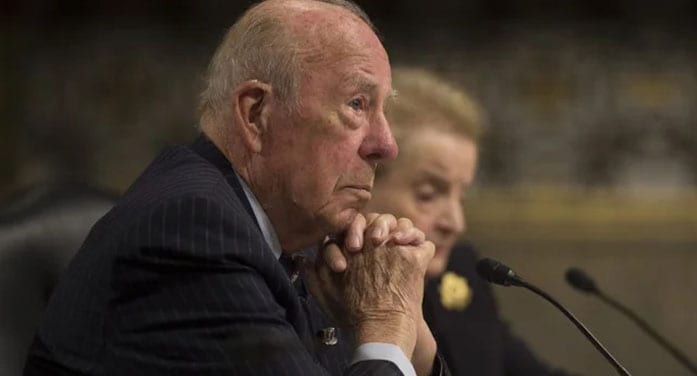 George Shultz, who died on Feb. 6 at the age of 100, was an important 20th-century figure. He was one of the good guys.
George Shultz, who died on Feb. 6 at the age of 100, was an important 20th-century figure. He was one of the good guys.
An economist by profession, Shultz was born in New York in 1920. He graduated from Princeton in 1942, served in the Marine Corps during the Second World War and subsequently earned his PhD in industrial economics. He went on to an academic career at the Massachusetts Institute of Technology and the University of Chicago.
In 1969, newly-elected U.S. President Richard Nixon tapped Shultz for a cabinet position as secretary of labour. Two other cabinet posts followed – director of the Office of Management and Budget and treasury secretary – before he exited for the private sector in 1974.
Reading Time: 4 minutes
If that’d been the end of Shultz’s government service, he’d be a footnote to a footnote. But it wasn’t. When he became Ronald Reagan’s secretary of state in 1982, a fruitful partnership was born.
Although they were acquainted, Shultz wasn’t part of the inner circle from Reagan’s California gubernatorial days. And Nixon, Shultz’s old boss, was adamantly opposed to his being appointed secretary of state.
After Reagan’s 1980 election victory, Nixon penned a long private memo concerning cabinet recommendations. Shultz, he said, wasn’t up to it: “I do not believe that he has the depth of understanding of world issues generally and the Soviet Union in particular that is needed for this period.”
But although Nixon’s favoured candidate, Alexander Haig, got the job, it didn’t work out well. So he was replaced by Shultz in mid-1982.
Personality issues aside, Haig’s tenure was troubled from the get-go. You might even say there were contradictory problems.
On the one hand, Haig fancied himself as the “vicar of foreign policy.” With the president’s benign support, he’d essentially call the shots.
But Reagan’s often detached management style and the lack of any prior personal relationship between the two men left Haig adrift. He had little sense of what Reagan wanted and felt undermined by competing voices within cabinet. Mutual frustration was thus inevitable.
Shultz, though, had no such difficulty.
On a personal level, Reagan came to trust him completely. Unlike Haig, Shultz had no particular hankering for the limelight.
And Shultz never forgot which of them had been elected president. It was his job to facilitate the implementation of Reagan’s policy preferences, not to impose his own.
In a sense, they were made for each other.
While Reagan was uninterested in the details of many issues and thus relatively passive with respect to their administration, there were some things – such as war, peace and the Soviet Union – that he felt passionately about. And on those, he was fully engaged.
Still, he needed someone like Shultz to get the job done, someone who would be sympathetic and prepared to challenge the foreign policy status quo. Reagan’s perspective, you see, had a dimension that eluded the contemporary commentariat.
Yes, Reagan was a hard-line anti-communist. But rather than subscribing to the conventional view of containing the Soviet Union, he perceived it as inherently unstable and thus susceptible to being transcended.
He also had a visceral loathing for nuclear weapons and the received wisdom of mutual assured destruction. In the words of Cold War historian John Lewis Gaddis, Reagan “was the only nuclear abolitionist ever to have been president of the United States.”
These unorthodox views meant that many of those associated with Reagan saw him as someone to be managed and fenced in. Shultz, in contrast, saw him as someone to be facilitated.
To quote Philip Taubman, author of a forthcoming Shultz biography, he “essentially enabled Reagan to break free of the coterie of conservative national security advisers that surrounded him.”
Attributing the Cold War’s demise to the Reagan-Shultz partnership is too simple. Mikhail Gorbachev and Soviet internal problems had a lot to do with it too.
But as Gaddis underscores, individuals matter. Had Reagan died in the 1981 assassination attempt, history might have unfolded differently.
Our story has a poignant coda.
When Shultz paid the Reagans a social call a couple of years after the then-retired president’s Alzheimer’s diagnosis, Reagan was puzzled. So he asked his nurse a question.
“Who is that man sitting with Nancy on the couch? I know him. He is a very famous man.”
Troy Media columnist Pat Murphy casts a history buff’s eye at the goings-on in our world. Never cynical – well perhaps a little bit.
For interview requests, click here. You must be a Troy Media Marketplace media subscriber to access our Sourcebook.
The views, opinions and positions expressed by columnists and contributors are the author’s alone. They do not inherently or expressly reflect the views, opinions and/or positions of our publication.

